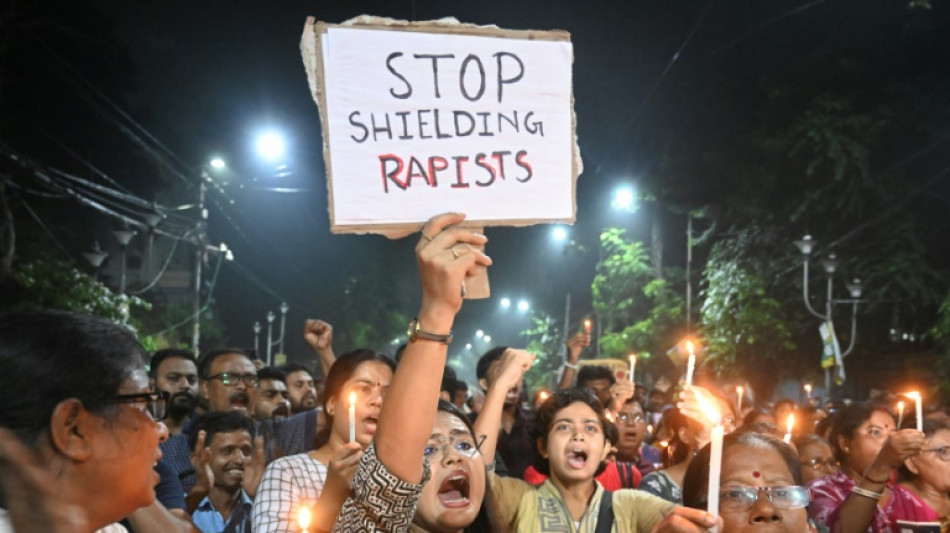

Indian protests over doctor's murder grow as women demand justice
Thousands took to the streets of Kolkata early Thursday to condemn the rape and murder of a local doctor, demanding justice for the victim and an end to the chronic issue of violence against women in Indian society.
The discovery of the 31-year-old's brutalised body last week at a state-run hospital has sparked nationwide protests, with Prime Minister Narendra Modi demanding swift punishment for those who commit "monstrous" deeds against women.
Large crowds marched through the streets of Kolkata in West Bengal to condemn the killing, with a candlelight rally at midnight coinciding with the start of India's independence day celebrations on Thursday.
The protesters in Kolkata, who marched under the slogan "reclaim the night", called for a wider tackling of violence against women and held up handwritten signs demanding action.
"We want justice," read one sign at the rally. "Hang the rapist, save the women," read another.
"The atrocities against women do not stop," midnight marcher Monalisa Guha told Kolkata's The Telegraph newspaper.
"We face harassment almost on a daily basis," another marcher, Sangeeta Halder, told the daily. "But not stepping out because of fear is not the solution."
- 'Anger in the nation' -
Modi, speaking in New Delhi on Thursday morning at independence day celebrations, did not specifically reference the Kolkata murder, but expressed his "pain" at violence against women.
"There is anger for atrocities committed against our mothers and sisters, there is anger in the nation about that," he said.
"Crimes against women should be quickly investigated; monstrous behaviour against women should be severely and quickly punished," he added.
"That is essential for creating deterrence and confidence in the society."
Doctors are also demanding swift justice and better workplace security in the wake of the killing, with those in government hospitals across several states on Monday halting elective services "indefinitely" in protest.
Protests have since occurred in several other hospitals across the country, including in the capital.
"Doctors nationwide are questioning what is so difficult about enacting a law for our security," Dhruv Chauhan, from the Indian Medical Association's Junior Doctors' Network, told the Press Trust of India news agency.
"The strike will continue until all demands are formally met".
The Telegraph on Thursday praised the "spirited public protests" across India.
"Hearteningly, doctors and medical organisations are not the only ones involved," it said in an editorial.
"The ranks of the protesters have been swelled by people from all walks of life".
- Echoes of Delhi bus rape -
Indian media have reported the murdered doctor was found in the teaching hospital's seminar hall, suggesting she had gone there for a brief rest during a long shift.
An autopsy has confirmed sexual assault, and in a petition to the court, the victim's parents have said that they suspected their daughter was gang-raped, according to Indian broadcaster NDTV.
Though police have detained a man who worked at the hospital helping people navigate busy queues, officers have been accused of mishandling the case.
Kolkata's High Court on Tuesday transferred the case to the elite Central Bureau of Investigation (CBI) to "inspire public confidence".
In the early hours of Thursday, a mob of some 40 people angry at authorities' handling of the case stormed the grounds of the R.G. Kar Medical College and Hospital, the site of the murder.
The men smashed property and hurled stones at police, who fired tear gas in response, authorities said.
West Bengal lawmaker Abhishek Banerjee, from the Trinamool Congress party, condemned the "hooliganism and vandalism", but said "the demands of the protesting doctors are fair and justified".
Sexual violence against women is a widespread problem in India -- an average of nearly 90 rapes a day were reported in 2022 in the country of 1.4 billion people.
For many, the gruesome nature of the attack has invoked comparisons with the horrific 2012 gang rape and murder of a young woman on a Delhi bus.
The woman became a symbol of the socially conservative country's failure to tackle sexual violence against women.
Her death sparked huge, and at times violent, demonstrations in Delhi and elsewhere.
Under pressure, the government introduced harsher penalties for rapists, and the death penalty for repeat offenders.
Several new sexual offences were also introduced, including stalking and jail sentences for officials who failed to register rape complaints.
B.A.Bauwens--JdB



